

The Final Hours of Startups, Respect Your Customers, Airbnb's Early Days, Implications of VC Money, Iteration Over Inspiration. Barack Obama Becomes The First President To Write Code. The Fatal Pinch. December 2014 Many startups go through a point a few months before they die where although they have a significant amount of money in the bank, they're also losing a lot each month, and revenue growth is either nonexistent or mediocre.
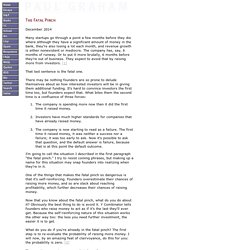
The company has, say, 6 months of runway. Or to put it more brutally, 6 months before they're out of business. They expect to avoid that by raising more from investors. [1] That last sentence is the fatal one. There may be nothing founders are so prone to delude themselves about as how interested investors will be in giving them additional funding. The company is spending more now than it did the first time it raised money. One of the things that makes the fatal pinch so dangerous is that it's self-reinforcing. If You Don’t Respect Your Customers You Won’t Be Successful. I spend a lot of time with startups and thus hear many companies talk about their approach to sales and their interactions with customers.
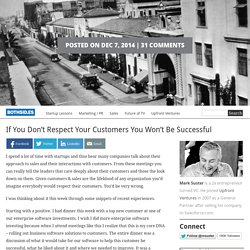
From these meetings you can really tell the leaders that care deeply about their customers and those the look down on them. Given customers & sales are the lifeblood of any organization you’d imagine everybody would respect their customers. You’d be very wrong. I was thinking about it this week through some snippets of recent experiences. Starting with a positive. Contrast that with a VC conversation I had. I cringed. Most of the great VCs I know truly care about their LPs. I can’t imagine being in this business if you didn’t respect, like and value your investors.
If you don’t respect your LPs I’m not sure you’re in the right business. Similarly I see entrepreneurs on Twitter who constantly take pot shots at VC as an industry. Ten Realities of Taking Venture Capital Money. If you take venture capital money... 1) You increase the chances that you may not be CEO of your own company one day--and that also might be the best thing for its long term success. 2) You are signing up to sell the company one day--to another company or to the public market, but definitely to someone. 3) You will almost certainly take more venture capital money after that. 4) You will almost certainly go cashflow negative, increasing the risk that your company will fail. 5) You now have the responsibility to report the progress of the company to others--and to consider their opinions and feedback.
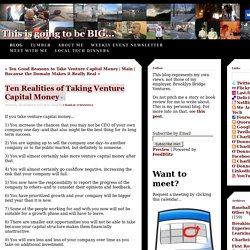
Subject: Airbnb. Yesterday Fred Wilson published a remarkable post about missing Airbnb.
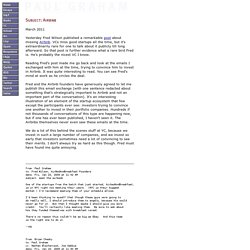
VCs miss good startups all the time, but it's extraordinarily rare for one to talk about it publicly till long afterward. So that post is further evidence what a rare bird Fred is. He's probably the nicest VC I know. Reading Fred's post made me go back and look at the emails I exchanged with him at the time, trying to convince him to invest in Airbnb. It was quite interesting to read. Fred and the Airbnb founders have generously agreed to let me publish this email exchange (with one sentence redacted about something that's strategically important to Airbnb and not an important part of the conversation). We do a lot of this behind the scenes stuff at YC, because we invest in such a large number of companies, and we invest so early that investors sometimes need a lot of convincing to see their merits. One of the startups from the batch that just started, AirbedAndBreakfast, is in NYC right now meeting their users.
Airbnb. When you walk into our conference room at Union Square Ventures, you see the box of cereal on the right on our conference room credenza next to a wifi router and a jar of Jolly Ranchers.
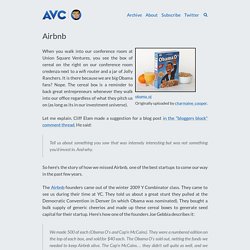
It is there because we are big Obama fans? Nope. The cereal box is a reminder to back great entrepreneurs whenever they walk into our office regardless of what they pitch us on (as long as its in our investment universe). Let me explain. Cliff Elam made a suggestion for a blog post in the "bloggers block" comment thread. Tell us about something you saw that was intensely interesting but was not something you'd invest in.
So here's the story of how we missed Airbnb, one of the best startups to come our way in the past few years. The Airbnb founders came out of the winter 2009 Y Combinator class. We made 500 of each (Obama O's and Cap'n McCains). I asked them if they'd leave a box of the cereal for us and it has been sitting in our conference room ever since. Divine Inspiration Fallacy. When you first start creating products it is easy to succumb to divine inspiration fallacy.
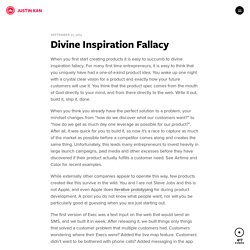
For many first time entrepreneurs, it is easy to think that you uniquely have had a one-of-a-kind product idea. You wake up one night with a crystal clear vision for a product and exactly how your future customers will use it. You think that the product spec comes from the mouth of God directly to your mind, and from there directly to the web. Write it out, build it, ship it, done. When you think you already have the perfect solution to a problem, your mindset changes from “how do we discover what our customers want?” While externally other companies appear to operate this way, few products created like this survive in the wild. The first version of Exec was a text input on the web that would send an SMS, and we built it in week. Do the bare minimum to prove your hypothesis. Some experiments will work, and some will not.